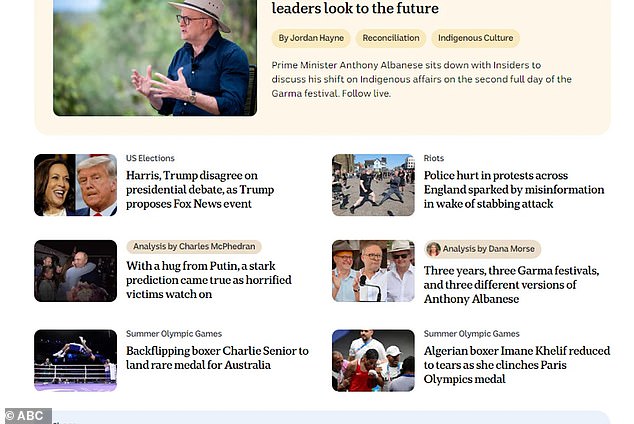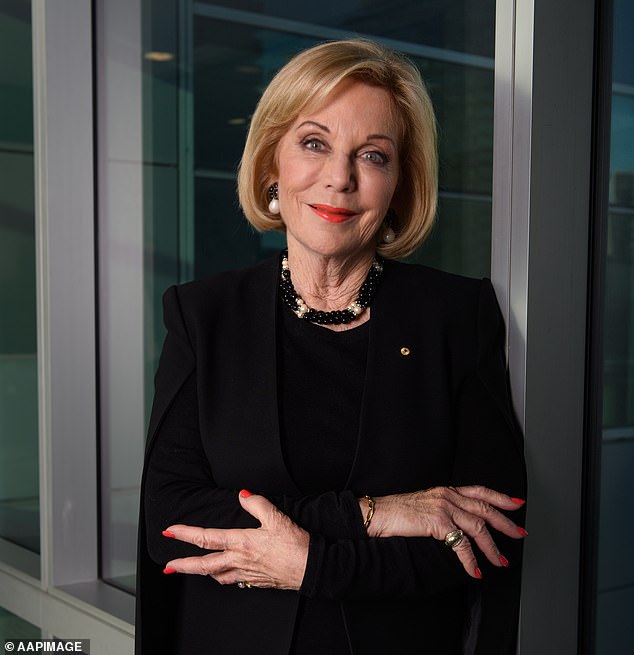ABC chairman Kim Williams erupts at his own staff with assessment of its website
The chairman of the ABC has criticised the national broadcaster’s ‘prioritisation’ of news, urging journalists to focus on hard news rather than lifestyle stories.
Kim Williams criticised the order of stories on the ABC’s website during a speech to Radio National staff late last month.
Leaked audio of the meeting obtained by the Sydney Morning Heraldrevealed that the chairman wants to take a more active role in the organisation’s news department than his predecessor, Ita Buttrose, who left the national broadcaster in March.
“I believe that in times of public distress, crisis, division or challenges to leadership, people have a right to access our information in a reliable and direct way, rather than having a certain lifestyle story suddenly become number one, two or three,” Williams said of the website’s homepage.
Williams used a homepage from a random day as an example.
He pointed out that the main news reports made no mention of a NATO meeting that week, the ongoing unrest surrounding the French elections or the wars in Gaza or Ukraine.
“We need to have a better coherent logic around how stories are prioritized. And I think that’s not surprising, and in fact much more aligned with the way people expect new services to be delivered,” Williams said.
“I don’t think I’m apologizing for the fact that I think news needs to be prioritized in the right way. Sorry if that’s unsatisfactory.”
ABC chair Kim Williams (pictured) criticised the broadcaster’s website’s prioritisation of lifestyle stories over hard news

Williams wants to revamp the ABC’s news website homepage, radio station and marketing
The ABC has begun rolling out its new website design to some users, which should help the public navigate the news section more easily.
It will go fully live in two weeks, on August 19th.
Staff appeared to take Williams’ criticism to heart, publishing key stories on the ABC website on Sunday, notably Prime Minister Anthony Albanese’s visit to the Garma Festival, the US election, riots in Britain, the Olympics and a report on Russia.
In late July, Williams met with Radio National staff at the ABC’s Sydney office and online as part of his efforts to revamp the department.
His aim is to achieve a similar reach to that of BBC Radio 4 in the UK, which reaches 17 per cent of the population each week. That compares with the ABC’s Radio National, which reaches just 1.5 per cent of the population in Sydney and 1.6 per cent in Melbourne.

The ABC’s new website design (pictured) will go live in two weeks, on August 19
Station manager Dina Rosendorff will evaluate the station’s marketing and programming and launch a project to change the slogan from ‘think bigger’.
Williams also wants to focus on the ABC’s overall marketing strategy so that all departments are more cohesive for the public.
My view on ABC programming is that [it] “It has to always be distinctive. Why would you do it if it’s not? ABC programming has to be bold. It has to be something that really stands out, and that you can embrace and be proud of, and we have to do that very regularly,” Williams said.
While the proposed plans require more funding, Williams said he will look to the work of former 1988 chairman David Hill, who was more active in cabinet, rather than cutting current funding from smaller departments.
“There has been very little advocacy from the board level for the ABC for decades, and that is regrettable. There is no doubt that boards had reasons for what happened. I am not pointing fingers at anyone other than citing effect,” he said.

Kim Williams’ comments come after former chair Ita Buttrose (pictured) criticised ABC journalists for being “too soft” and suggested they should resign if they could not handle criticism.
Williams’ comments come days after his predecessor caused a stir by criticising journalists at the national broadcaster for being “too sensitive” and biased.
Ms Buttrose made the explosive claims about Patricia Karvelas Radio National Breakfast show last Monday.
She also alleged that some journalists at the company were biased, adding that anyone who is biased or sensitive ‘should just give up’ if they can’t handle criticism.
“There’s no harm in covering both sides of an argument, and I don’t understand why some of our interviewers don’t want to do that,” she said.
‘If you show both sides of the story, it’s much better for the viewer or listener.
